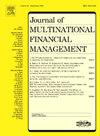Foreign bank entry and corporate emissions: Evidence from staggered deregulations in China
IF 4
3区 经济学
Q2 BUSINESS, FINANCE
Journal of Multinational Financial Management
Pub Date : 2025-06-23
DOI:10.1016/j.mulfin.2025.100919
引用次数: 0
Abstract
In this study, we estimate the impact of staggered foreign bank entry deregulation in China on corporate emissions. We find that firms significantly reduce their emissions following the entry of foreign banks. This impact is more concentrated in financially constrained and bank dependent firms, as well as firms with severe ex-ante agency costs. Firms exposed to high environmental litigation risk, facing less local economic pressure to meet growth targets and located in areas with lower ex-ante banking competition also show a significant reduction in emissions post-foreign bank entry deregulation. Moreover, our investigation shows that foreign bank entry contributes to corporate emissions reduction through the adoption of pollution abatement equipment and green technologies. Overall, we uncover new evidence on the impact of foreign bank entry on social welfare outcomes, thereby expanding our understanding of the role of financial market openness in moving toward a low-carbon economy.
外资银行进入和企业排放:来自中国交错放松监管的证据
在本研究中,我们估计了中国错开外资银行进入管制对企业排放的影响。我们发现,外资银行进入后,企业的排放量显著减少。这种影响更集中在财政拮据和依赖银行的公司,以及有严重事前代理成本的公司。面对高环境诉讼风险的公司,面临较少的地方经济压力以实现增长目标,以及位于银行前竞争较低的地区,在外资银行进入放松管制后,排放量也显著减少。此外,我们的调查表明,外资银行的进入通过采用污染减排设备和绿色技术有助于企业减排。总体而言,我们发现了外资银行进入对社会福利结果影响的新证据,从而扩大了我们对金融市场开放在迈向低碳经济中的作用的理解。
本文章由计算机程序翻译,如有差异,请以英文原文为准。
求助全文
约1分钟内获得全文
求助全文
来源期刊

Journal of Multinational Financial Management
BUSINESS, FINANCE-
CiteScore
7.30
自引率
4.80%
发文量
25
审稿时长
30 days
期刊介绍:
International trade, financing and investments have grown at an extremely rapid pace in recent years, and the operations of corporations have become increasingly multinationalized. Corporate executives buying and selling goods and services, and making financing and investment decisions across national boundaries, have developed policies and procedures for managing cash flows denominated in foreign currencies. These policies and procedures, and the related managerial actions of executives, change as new relevant information becomes available. The purpose of the Journal of Multinational Financial Management is to publish rigorous, original articles dealing with the management of the multinational enterprise. Theoretical, conceptual, and empirical papers providing meaningful insights into the subject areas will be considered. The following topic areas, although not exhaustive, are representative of the coverage in this Journal. • Foreign exchange risk management • International capital budgeting • Forecasting exchange rates • Foreign direct investment • Hedging strategies • Cost of capital • Managing transaction exposure • Political risk assessment • International working capital management • International financial planning • International tax management • International diversification • Transfer pricing strategies • International liability management • International mergers.
 求助内容:
求助内容: 应助结果提醒方式:
应助结果提醒方式:


